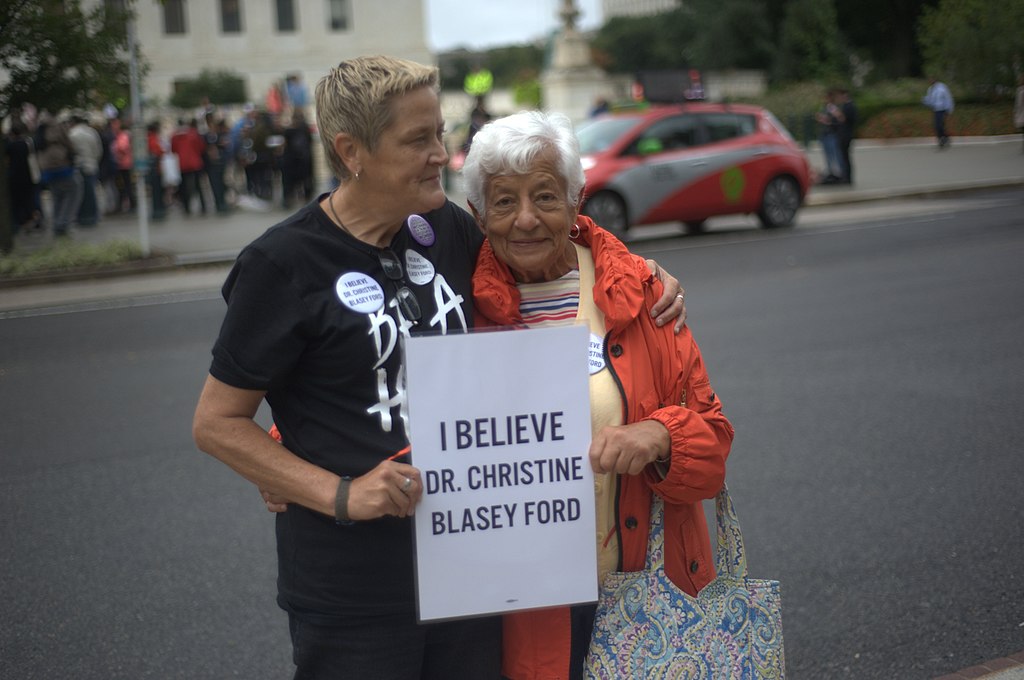Disrespect for Women—Indelible in the Hippocampus
Editor’s Note: The confirmation hearings of Brett Kavanaugh, the allegations against him, and the subsequent congressional hearing interviewing Dr. Blasey Ford have spurred many difficult, complex reactions. This week, we will be publishing varied perspectives on the spectrum of topics brought to the fore by Dr. Blasey’s hearing. This is the first of that series.
On Thursday, September 27th, Dr. Christine Blasey Ford appeared in front of the Senate Judiciary Committee to discuss her allegation that Supreme Court Nominee Brett Kavanaugh attempted to rape her at a high school get together in the early 1980s. Judge Kavanaugh also testified at the hearing, denying the allegations without qualification. When asked repeatedly if he would support an FBI investigation that might potentially clear his name, he dodged the question.
By Friday morning, it seemed all but certain that the Kavanaugh nomination would be approved by the committee. There had been some speculation that Senator Jeff Flake (R-AZ) might be a holdout, but a statement released by the senator Friday morning indicated that he would vote to move the candidate forward after all. Then something remarkable happened. Two passionate women approached Senator Flake with a message: “You’re telling all women that they don’t matter. That they should just stay quiet because if they tell you what happened to them, you’re going to ignore them.”
For many women, this nomination is, essentially, a litmus test for misogyny. What’s more, it is taking place in a political context in which women already have reason to feel that they aren’t being taken seriously. In this case, it’s up to a primarily male committee to decide which violations of a woman’s body and dignity deserve to be heard and investigated.
Navigating one’s relationship to one’s body is a challenging and ever-evolving existential feature of being human. No person lives a life untouched by this—we all experience scarring and blemishes, weight loss and weight gain, aging and wrinkling. Looking on with very little control, our bodies often feel less like who we are and more like vessels in which we are trapped. Current cultural norms exacerbate this existential challenge to maddening levels in the case of women in particular because we are made, in countless ways, to feel as if we are reducible to our bodies. Nevertheless, when we try to assert any meaningful sense of ownership over them, we are met with resistance. We are told whether and which violations of our bodies matter, and how much they matter. We are not only told that we are reducible to our bodies, we are told which features of our bodies we are reducible to.
Aristotle argued that virtue is a social enterprise. Successful societies encourage and assist in the development of virtuous citizens. Young citizens learn good habits by watching the behavior of role models in their governments and communities. We can only hope that today’s young men and women aren’t modeling their traits of character with respect to how to treat women on the behavior of contemporary politicians. Aristotle’s own attitudes toward women weren’t worthy of emulation either, but he was right that young people look to older people to determine how they should behave. They need better role models when it comes to the treatment of women—role models who understand that women’s interests should be taken seriously and their dignity should be respected.
Respect for the dignity of women dictates that women are treated always as autonomous beings, not as prizes in the alpha male Olympics. This goal is, of course, undermined when future presidents brag about being powerful enough approach women and grab them by the genitals and nominees to the Supreme Court boast about female conquests in high school yearbooks and then tell obvious lies when asked about it years later.
Respect for the dignity of women requires the acknowledgment that men and women alike are the authors of their own narratives, and female stories are successful and compelling even in the absence of physically stunning leading ladies. Our success or failure as women has nothing to do with what we look like, how old we are, or how much we weigh. The understanding of women as creators of their own destinies is undermined by comments like the one then-candidate Trump had for his opponent, Carly Fiorina, in the Republican primaries: “Look at that face, would anybody vote for that?”
Respect for the dignity of women is undermined when we are treated as if we are epistemic inferiors—like we don’t know good evidence from bad evidence—especially when that evidence concerns our bodies. Dr. Ford, a well-respected college professor with dozens of publications, was treated as if she might simply just be confused about the attempted rape. Republicans on the Senate Judiciary Committee were quick to acknowledge that she was a good, credible witness. During a break, after Dr. Ford had offered her testimony, Senator Orrin Hatch (R-UT) told reporters that he found her to be a nice, attractive woman. On the topic of whether he believed what she had to say, he said, “It’s too early to say. I don’t think she’s uncredible. But it’s way early.” Credible, nice people don’t typically invent conspiracy theories to unfairly affect the machinations of government, so what is Hatch trying to say here? Similarly, after Dr. Ford’s testimony, Senator Lindsey Graham (R-SC) said, “I think something happened to Dr. Ford. I’m gonna listen to Brett Kavanaugh.” After Kavanaugh’s testimony, Graham said, “I am now more convinced than ever that he didn’t do it, that he’s the right guy to be on the court.” President Trump got involved in similar speculation. He indicated a willingness to listen to what Dr. Ford had to say, but also said, of Kavanaugh, “I can only say this, he is such an outstanding man, very hard for me to imagine that anything happened,”
There is a decent amount of speculation that Dr. Ford is not lying, she’s simply mistaken. This may be one way of interpreting the seemingly contradictory message that Dr. Ford is nice and credible, but that Judge Kavanaugh should be confirmed and is being treated unfairly. Dr. Ford and Judge Kavanaugh are making statements that can’t both be true. All things being equal, the appropriate response seems like it ought to be suspension of judgment until more facts are known. That isn’t what happened here. Instead, the conclusion is that Dr. Ford must be mistaken. Knowledge by acquaintance is fairly easily won in our day-to-day lives. For some reason Dr. Ford is being treated as if identifying her rapist in this case is tricky, even though she knew him before he raped her. Women get the message—when the word of a woman is in conflict with the word of a powerful man, it’s probably the man who remembers the event correctly. In fact, it’s so likely that it is the man who remembers the event correctly that there is no reason for any additional investigation.
A woman doesn’t have to take the harrowing step of testifying in front of a Congressional committee to have the experience of being treated as if she doesn’t know how to assess evidence. Legislation across the country forces women’s hands when it comes to access to family planning, contraception, and abortion services. 38 states have “informed consent” laws in place according to which women seeking an abortion must be given a packet of information selected by the state legislature. They must then wait some period of time during which they are supposed to reflect on the information given to them, often 24 hours. The information on which they are being asked to reflect is not information they sought out, it is unsolicited, and often unwanted, advice from the state legislature on what type of evidence women should take seriously when it comes to their bodies. The implication is that women don’t know which considerations to take seriously on their own.
In a surprise turn of events, Senator Flake was moved by the words of the women who expressed that they were feeling marginalized. He changed his vote. It didn’t affect the outcome in committee, but all parties involved know that Judge Kavanaugh is unlikely to win a vote on the Senate floor without Flake’s support. Flake indicated he would vote no unless an FBI investigation was done into Ford’s allegations. Perhaps all is not lost, maybe some senators are proper role models after all. Then again, the investigation has been limited in scope and is not supposed to last longer than one week. Women’s interests should be given consideration, but not as much consideration as political interests.





